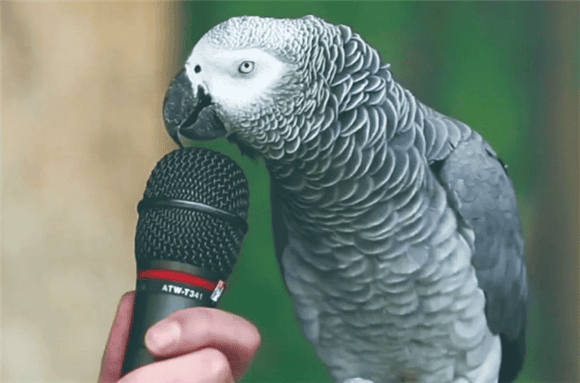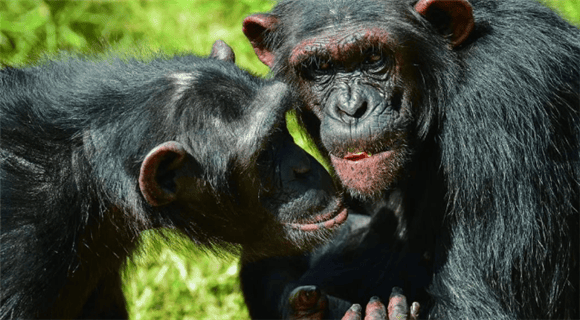Children like to raise chickens and ducks, urban youth prefer cats and dogs, and older people may be more willing to raise birds, among which talking parrots are more popular. Well-trained parrots can not only sing to entertain themselves, but can even chat and amuse themselves with their owners and send out "hello" greetings. Their ability to imitate human speech is often astonishing.
However, have you ever wondered why parrots can imitate human speech, while our close relatives such as gorillas can only hiss and cannot even imitate human speech?

Parrots have the advantage of speaking human language
Let's look at it first See why parrots can imitate human speech.
The vocal cords are an important part of human vocal organs, and the syrinx is the sound generator of parrots, located at the junction of the trachea and bronchi. When the airflow enters the syrinx, the bird can make different sounds as the walls of the syrinx vibrate. In addition to having the most basic characteristics of the vocal organs of birds, the parrot's syrinx also has syrinx muscles that can adjust the diameter, sound rate, and tension of the syrinx. They can contract or relax under the control of the nervous system, thereby emitting complex sounds. chirp. Moreover, the talking parrot's tongue is very developed, thick and smooth, and its shape is similar to the human tongue, which can help it imitate human speech.
In addition, parrots also have a special brain structure. Generally, birds have a specific area in the brain that controls sound learning, called the "core", but parrots also have a "shell" around the core, which is also involved in sound learning activities. Scientists speculate that parrots' strong imitation ability may be related to the shell area. The gene sequence in this structure may explain why parrots can imitate various sounds and dance to music. However, the specific vocalization mechanism remains to be further explored by scientists.
Why our closest relatives cannot speak
After understanding why parrots can talk, let us now turn our attention to our closest relatives, the primates. Scientists have long believed that non-human primates cannot speak because they do not have the structure to produce sounds like humans, but new research shows that their inability to speak is not actually due to vocal cords, but because they have not evolved to produce high-level sounds. The language brain cannot produce sounds as complex as human language.
Scientists used X-ray images to build vocal cord models of macaques and other animals, and found that macaques can easily produce many different sounds, including the most basic five vowel letters: A, E, and I. ,O,U. This shows that the vocal organs of macaques have the ability to speak. There is no doubt that the brain is the factor that affects their language ability.
Researchers believe that this is mainly related to two areas in the brain: the cortical association area (which is the core part of higher-level brain functions and is considered the basis for primates to complete complex behaviors) and the brainstem Nuclei (nerves that control vocal muscles). When these areas of the brain are larger or take up a larger proportion of the brain, the primates are more vocal, and conversely, the primates are less able to produce unique sounds. For example, chimpanzees and bonobos have very flexible tongues and can produce 40 to 50 different sounds, while golden koala monkeys only use two different sounds for pronunciation, because the proportions of cortical association areas and brainstem nuclei are different. So although our closest relatives have vocal structures, they lack the necessary neural control to imitate or replicate human speech.
Parrot copying is just a conditioned reflex
All living things have unique ways of communicating information, such as the barking of dogs, the dancing of bees, and the chemical signals between plants. Human beings have complex Language is our important communication tool and arguably our greatest evolutionary advantage. So, parrots can imitate human speech, but their human relatives can only hiss. Does this mean that parrots are the heirs to global dominance and that their human relatives are not as powerful as imagined?

The answer is of course no. Although some parrots do have the advantage in physiological conditions to imitate human voices, parrots that speak human language cannot actually understand human language. They just imitate and copy the sounds they hear, just like we don’t understand Italian. language, but imitating Italian to sing "My Sun" is not based on understanding. So human language remains our most unique evolutionary advantage.
If they can’t understand, then why do they imitate human voices? Some people believe that parrots are social creatures and they need to interact with the creatures around them. When kept as pets, they view their human owners as family and want to interact with humans. However, since human owners cannot learn the language of birds, they have to imitate their owners' language to attract attention. Of course, this statement is just a fairy tale interpretation, and parroting is actually just a conditioned reflex. For example, when people train a parrot, they associate the sounds of knocking on the door and "please come in" to stimulate the parrot. The parrot will store these signals, and after repeated stimulation, conditioned firing will be formed. So when it hears a knock on the door, it might yell "Come in."
However, whether it is a desire to interact with people or just a conditioned reflex, talking parrots bring us endless fun.

 扫一扫微信交流
扫一扫微信交流
发布评论